Why Regular AC System Checks Keep Your Home Comfortable
An AC system check is essential for maintaining cool comfort in your Bridgeville home, especially during hot Pennsylvania summers. Regular inspections help identify potential problems before they become expensive repairs and ensure your system runs efficiently when you need it most.
Key components to check in your AC system:
- Thermostat settings - Verify it's set to "cool" and at the right temperature
- Air filters - Check for clogs that restrict airflow and reduce efficiency
- Circuit breakers - Look for tripped breakers that cut power to your system
- Outdoor unit - Inspect for debris, damage, or unusual sounds
- Indoor vents - Ensure they're open and blowing cool air
- Refrigerant lines - Check for ice buildup or visible leaks
A dirty air filter is one of the most common causes of air conditioning problems. When filters become clogged with dust and debris, your system works harder and uses more energy to cool your home.
Most AC issues start small but can quickly escalate. Catching problems early through regular checks saves you money and prevents uncomfortable breakdowns during the hottest days of summer.
The good news? Many basic AC system checks take just a few minutes and require no special tools. However, some issues - particularly those involving refrigerant, electrical components, or major mechanical problems - require professional attention for safety and proper diagnosis.
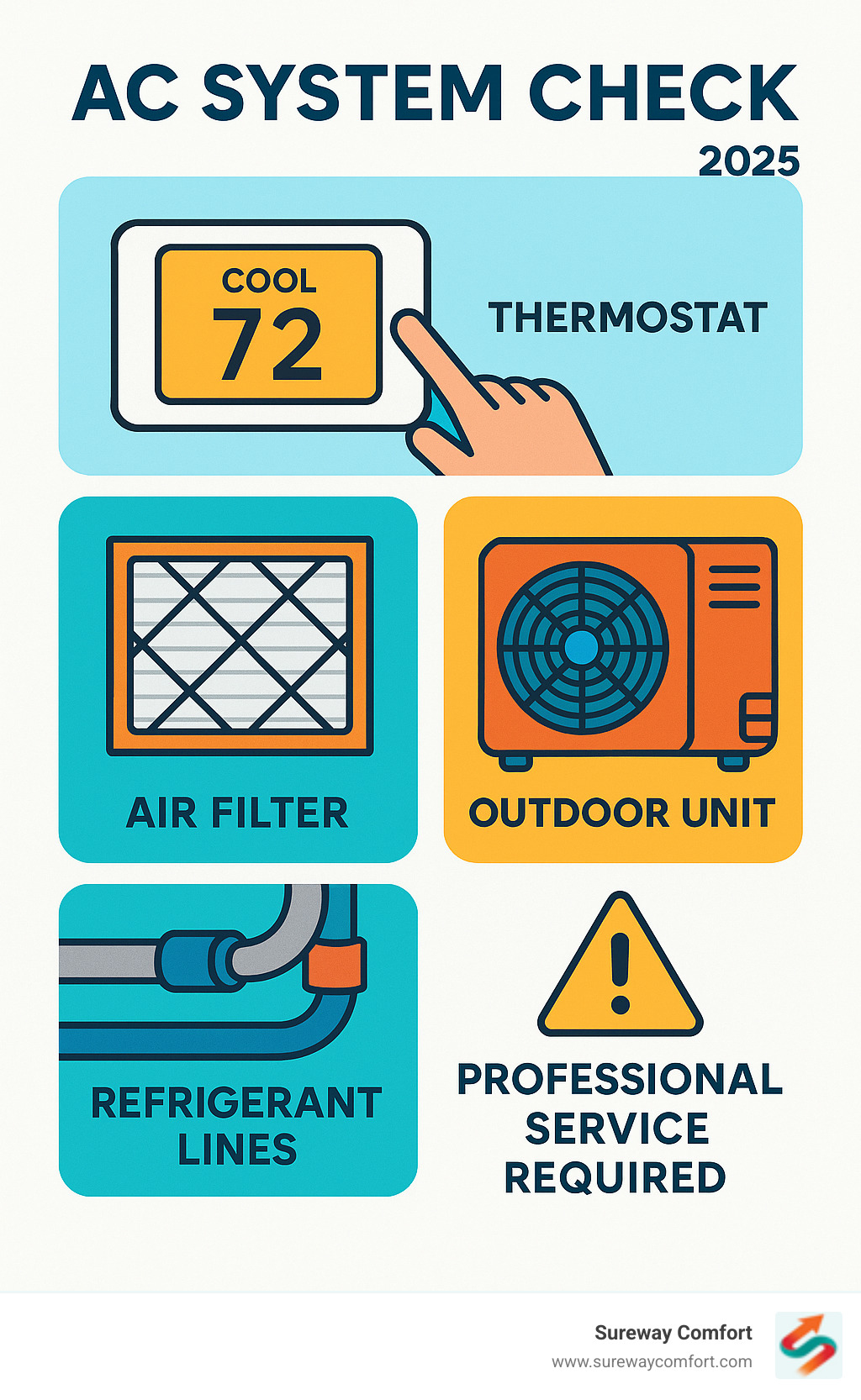
AC system check terms to know:
How Your Home Air Conditioning System Works
Before diving into your AC system check, it's helpful to understand the magic happening behind your walls. Your air conditioner doesn't actually create cold air – instead, it's like a heat-moving machine that grabs unwanted warmth from inside your home and tosses it outside.
The whole process revolves around a special chemical called refrigerant that has a neat trick: it can easily change between liquid and gas. This change is what allows your AC to absorb heat from your home and release it outdoors.
Think of it as a continuous loop where the compressor acts as the heart of the system, pumping refrigerant through different stages. Inside your home, the evaporator coil works with the blower motor to pull heat from your indoor air. Meanwhile, outside, the condenser releases that captured heat into the atmosphere.
Your thermostat controls this entire dance, telling the system when to start cooling and when your home has reached the perfect temperature. It's this heat exchange process that keeps you comfortable during those sweltering Pennsylvania summers.
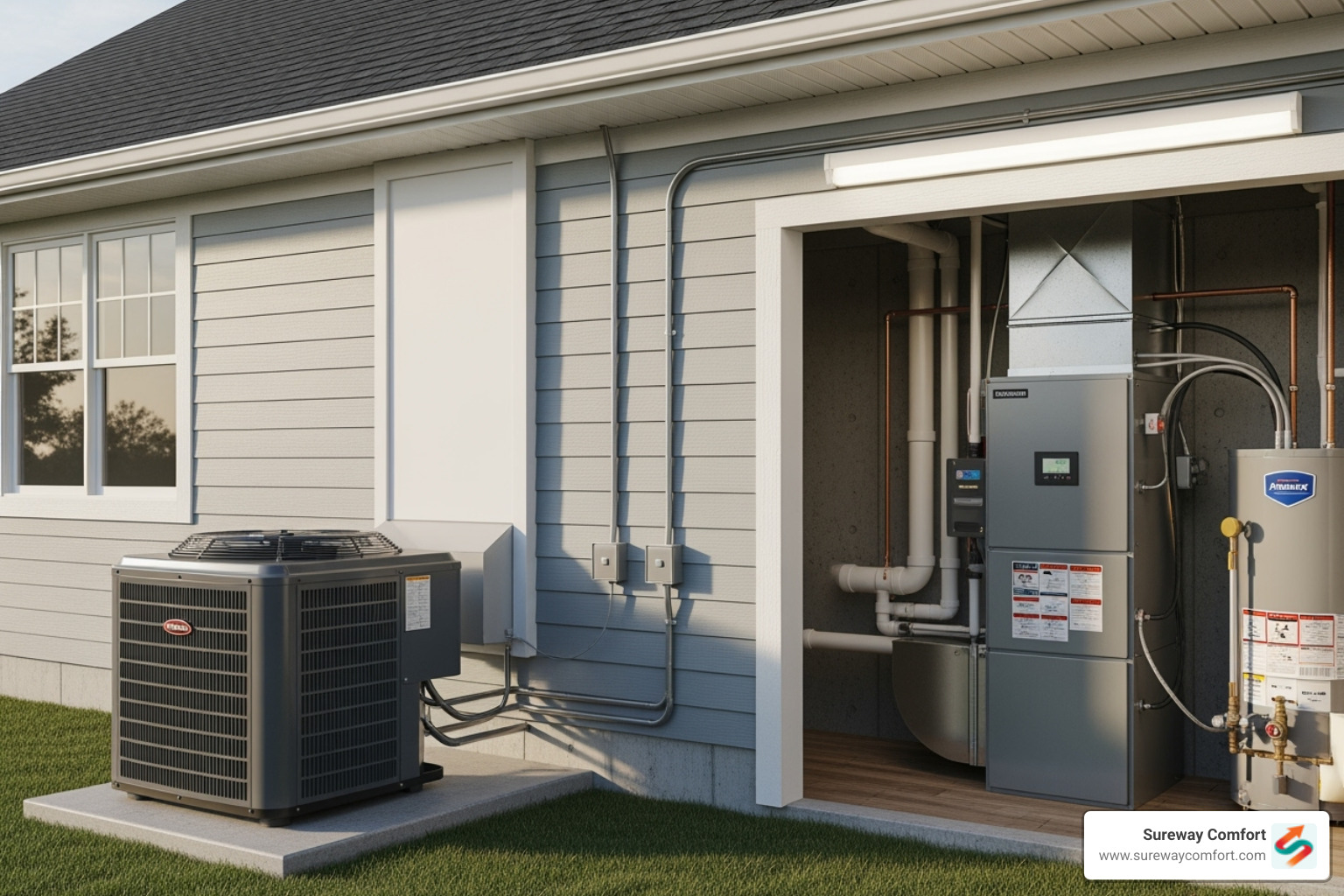
The refrigeration cycle happens in four main steps. First, warm air from your home passes over the evaporator coil, where liquid refrigerant absorbs the heat and transforms into a gas. This newly cooled air gets blown back into your living spaces while humidity condenses into water that drains away.
Next, the compressor pressurizes this gaseous refrigerant, making it extremely hot. The hot, pressurized gas then flows to the condenser coil outside, where the condenser fan blows outdoor air across it, allowing the refrigerant to release its heat and turn back into a liquid.
Finally, the expansion valve reduces the pressure of this liquid refrigerant, cooling it down significantly before it returns to the evaporator coil to start the cycle all over again. For a deeper primer on the underlying science, see Vapor-compression refrigeration.
For more comprehensive information about HVAC systems in your area, check out our guide on HVAC Services in Mt. Lebanon.
Key Components and Their Function
Understanding the supporting players in your AC system makes your AC system check much more effective. The refrigerant lines are copper tubes that connect your indoor and outdoor units – the larger insulated line carries cool gas, while the smaller uninsulated line carries warm liquid. Leaks in these lines are surprisingly common.
Your condenser fan lives in the outdoor unit and pulls air across the condenser coil to help release heat. Without this fan working properly, your system can't dump heat effectively, leaving you with poor cooling performance.
Inside your home, the blower fan circulates conditioned air through your ductwork. When you notice weak airflow, this fan or a dirty filter is often the culprit. If you're experiencing airflow issues, our guide on Troubleshooting AC Airflow Problems offers helpful solutions.
The expansion valve might be small, but it's crucial for regulating refrigerant flow into the evaporator coil. Problems here can throw off your entire system's pressure and cooling ability.
Don't forget about your drain line – as your AC removes humidity, that water has to go somewhere. The condensate flows through this line to a drain or outside your home. A clogged drain line can cause water leaks and potential damage to your home.
Your AC system needs exactly the right amount of refrigerant to work properly. Too little or too much refrigerant means poor performance. Even small amounts of air or water contamination can prevent proper cooling, which is why professional service requires precise measurement and handling of refrigerant.
Preliminary Checks You Can Do in 5 Minutes
Before you pick up the phone to call a technician, there are several quick and easy AC system check steps you can perform yourself. Many service calls are made for problems that homeowners could have fixed in just a few minutes - and we're always happy when our customers can solve simple issues on their own!
Start with your thermostat settings - this might sound obvious, but you'd be surprised how often we get calls where the thermostat is simply set to "HEAT" instead of "COOL" or the temperature isn't set low enough. After a long winter, it's easy to forget to switch modes when the weather warms up.
Next, check your circuit breaker. If your AC unit won't turn on at all, a tripped breaker is often the culprit. Head to your main electrical panel and look for a breaker labeled "air conditioner" or "AC." If it's in the "OFF" position or sitting halfway between "ON" and "OFF," firmly push it to "OFF" first, then back to "ON." If it trips again immediately, that's a sign of a more serious electrical issue that needs professional attention.
Your air filters deserve special attention during any AC system check. A dirty air filter is one of the most common causes of air conditioning problems, restricting airflow and making your system work much harder than it should. This leads to inadequate cooling, higher energy bills, and sometimes even ice buildup on your coils. Check your filter and replace it if it looks dirty - filters should be changed every three months, especially if you have pets or run your unit frequently.
Don't forget to examine your vents and registers throughout your home. Make sure all supply and return air vents are open and unobstructed by furniture, rugs, or drapes. Resist the temptation to close vents in unused rooms, as this actually disrupts your system's balance and can cause expensive damage by increasing pressure on your ductwork.
Finally, take a quick look at your outdoor unit. Is it clear of debris like leaves, grass clippings, or overgrown plants? Your condenser needs at least two to three feet of clear space around it to breathe properly. When debris builds up on the condenser coils, it becomes much harder for your system to release heat, leading to poor cooling performance and higher energy bills.
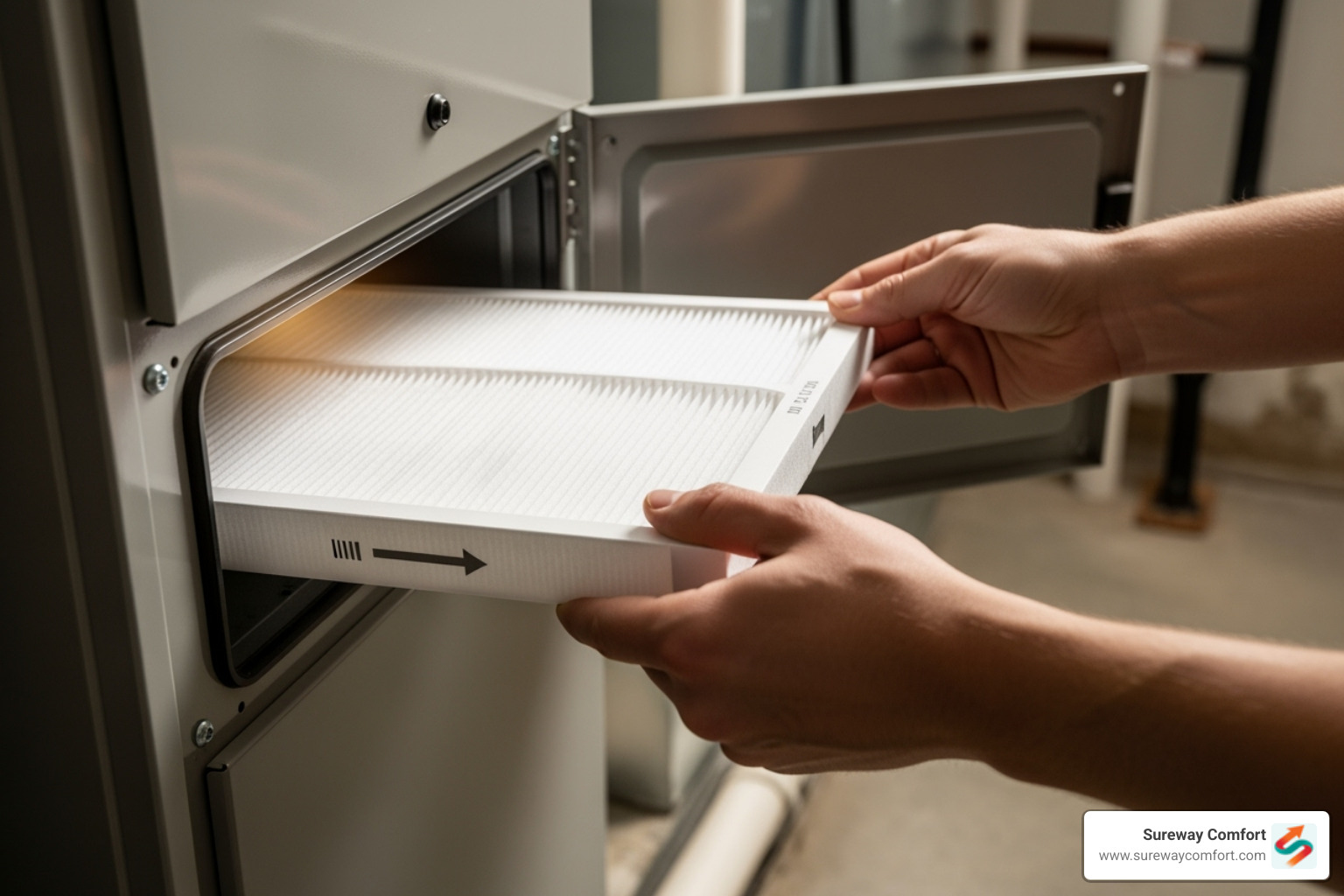
Why You Shouldn't Skip These Simple Steps
Taking a few minutes for these preliminary AC system check steps can save you significant time, hassle, and money. There's nothing more frustrating than waiting for a service appointment only to find the problem was a tripped breaker or incorrect thermostat setting!
By handling these basic troubleshooting steps yourself, you're saving time by resolving simple issues instantly without waiting for an appointment. You're also avoiding unnecessary service calls for minor problems that don't require professional expertise, which means our technicians can focus on customers who truly need complex repairs.
Most importantly, you're identifying simple fixes that put you in greater control of your home comfort. Regular maintenance tasks like changing filters become second nature once you understand their importance.
A dirty air filter really is one of the most common causes of air conditioning problems - ignoring this simple maintenance task can lead to much higher energy bills and even equipment failure. If you notice concerning symptoms during your basic checks, it might be time to look for Signs Your AC Needs Immediate Repair.
Simple DIY troubleshooting steps before calling a pro:
- Check thermostat settings (mode and temperature)
- Inspect circuit breakers for trips
- Replace dirty air filters
- Clear blocked vents and registers
- Remove debris from outdoor unit
- Listen for unusual sounds
- Feel for proper airflow from vents
How to Perform a Basic AC System Check
If preliminary checks don't solve the issue, it's time for a more thorough AC system check. These steps are safe for homeowners and don't require special tools.
Start with a visual inspection of both indoor and outdoor units. For the outdoor unit, turn off the power at the breaker first. Look closely at the condenser coil fins; bent fins or excessive dirt can restrict airflow and reduce efficiency. Check the fan blades for cracks or damage, which can also impact performance.
For your indoor unit, check the evaporator coil for dust buildup if it's accessible. Inspect the copper refrigerant lines for oily residue, which could indicate a leak.
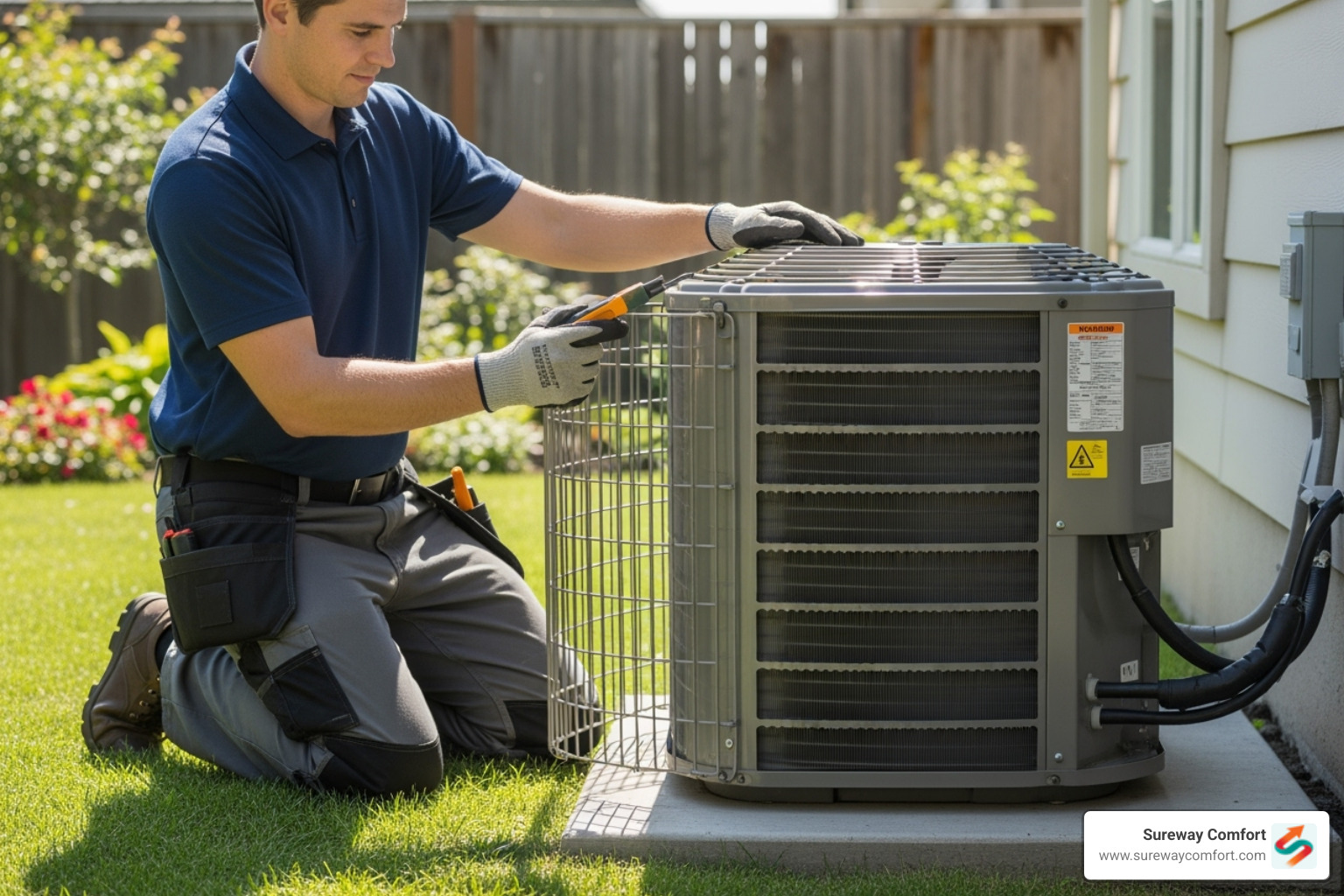
Next, turn the system on and listen carefully. The compressor should make a steady hum. Rapid clicking or cycling on and off can point to low refrigerant. Loud grinding, squealing, or banging noises are serious red flags that mean a major component is failing and needs immediate professional attention. If you're hearing unusual hissing sounds, our guide on Why Your AC is Making Hissing Sounds can help you understand what might be happening.
Your indoor blower motor should make a steady whooshing sound. Rattling or grinding suggests problems with the blower motor or fan.
Testing airflow and temperature provides valuable clues. You should feel strong, consistent airflow from each supply vent. Weak airflow could mean ductwork problems or a blower fan issue. The air should feel cool; a thermometer can confirm this. The air from supply registers should be at least 15 degrees cooler than the air entering return vents. A smaller difference indicates poor cooling efficiency.
Here's a simple test for your refrigerant lines: after the AC runs for 15 minutes, carefully feel the larger, insulated line. It should be cold, perhaps with condensation. If it's warm or frozen, there's a problem with the refrigerant system.
Interpreting Your AC System Check Results
Here's what your AC system check observations might mean:
When your AC blows warm air, it often points to low refrigerant, a failing compressor, or other major component issues. If your system is running but AC is Not Cooling Below 80 Degrees, it's time for professional help.
Weak airflow typically indicates a blockage, such as dirty filters, blocked vents, ductwork problems, or issues with your blower motor.
Ice formation on refrigerant lines or coils is always a sign of trouble. It's usually caused by severely restricted airflow or low refrigerant levels. Ice prevents proper cooling and can damage your system.
Water leaks from the indoor unit are common and often caused by a clogged condensate drain line. If you see water pooling, turn your system off immediately to prevent costly damage and call for professional help.
Strange smells are never normal. A musty odor suggests mold, a burning smell can mean electrical issues, and a sweet, chemical smell indicates a refrigerant leak. For more details, see our guide on AC is Making Strange Smells.
Performing this basic AC system check gives you valuable information to share with a technician, helping them diagnose problems more quickly.
Common AC Problems Revealed by an Inspection
Your DIY AC system check can uncover clues that point to larger issues requiring a professional. Strange sounds, weak airflow, or warm air are your system's way of asking for help.
Low refrigerant is a frequent culprit. If you noticed the outdoor compressor cycling on and off every few seconds, it could be a sign. Refrigerant is in a closed loop, so low levels almost always mean there's a leak.
Refrigerant leaks are one of the most common AC problems. Leaks can occur in coils, lines, or connection points. Telltale signs include oily residue, a sweet chemical smell, or ice formation. Finding and fixing leaks requires specialized equipment. Simply adding more refrigerant is a temporary fix. For comprehensive solutions, check out our guide on AC Refrigerant Leak Solutions. Our article on How to Tell if Your AC Refrigerant is Low can also help.
Compressor issues are serious. The compressor is the heart of your AC system, and its failure is a common cause of a broken air conditioner. Warm air from vents despite the unit running can indicate a failing compressor.
Fan problems, with either the indoor blower or outdoor condenser fan, can cause poor airflow, inefficient cooling, and overheating.
A clogged drain line can cause water leaks and mold growth. Regular cleaning is essential to prevent this.
Electrical faults involving circuit boards, capacitors, or wiring can prevent your system from turning on or cause it to perform erratically.
When Your AC System Check Points to a Professional
Your AC system check provides insight, but some problems require the tools and expertise of a licensed HVAC technician.
Refrigerant issues should always be left to the pros. Handling refrigerant requires certified training and specialized equipment for safety and to prevent environmental or system damage.
A word of caution: DIY recharge kits with "leak stop" additives can contaminate your system, leading to expensive repairs and potentially damaging professional service equipment. Avoid them.
Electrical problems require professional expertise. If a circuit breaker keeps tripping or you suspect wiring issues, call a professional. DIY electrical repairs are unsafe.
Major component failure often announces itself with loud grinding, squealing, or buzzing sounds. An outdoor fan that isn't spinning also signals a serious internal problem. These repairs require professional tools and knowledge. If you're dealing with persistent buzzing, our guide on AC is Making Buzzing Sounds offers more insights.
System contamination with air or water vapor can severely reduce cooling performance. Only professionals can properly evacuate and recharge a system to ensure it is contaminant-free and charged to precise specifications.
Professional service fixes the immediate problem and ensures long-term system health. When your AC system check reveals issues beyond your comfort zone, it's time to call for help.
Frequently Asked Questions about AC System Checks
Here are answers to common AC system check questions from homeowners.
How often should I have my AC system professionally checked?
An annual check, ideally in the spring, is recommended to ensure efficiency and prevent breakdowns. Having your AC professionally inspected before summer helps catch small problems before they become expensive emergencies. Spring is ideal as technicians are less busy, giving you time to address any issues found. This proactive approach is a key part of Regular AC Maintenance for Peak Performance.
What are the signs of a refrigerant leak?
Signs include hissing sounds, frozen coils, warm air from vents, longer cooling cycles, and a sweet, chemical smell. Ice buildup or a sudden spike in energy bills can also indicate a leak. Leaks start small and worsen over time, so a minor issue now can become a major problem later. A professional is needed to handle refrigerant.
Can I check my AC pressure myself?
No. Checking and handling refrigerant should be left to certified technicians. A professional HVAC Diagnostic Service is the safest option. DIY pressure gauges are risky because refrigerant systems operate under extremely high pressure that can cause serious injury. Modern systems also require precise refrigerant amounts measured by weight, not just pressure.
Interpreting pressure readings is complex and requires experience; a low reading could indicate various issues, from a clogged filter to a compressor problem. Professional technicians have the proper equipment and training to handle these systems safely. They can also properly evacuate and recharge your system, ensuring it's contaminant-free and charged to exact specifications.
Stay Cool and Confident with Professional AC Service
Performing a basic AC system check empowers you as a homeowner to understand your cooling system better and potentially avoid unnecessary service calls for simple fixes. You've learned how to spot common warning signs, perform quick troubleshooting steps, and recognize when it's time to call in the professionals.
The truth is, while DIY checks are incredibly valuable, some problems simply require professional expertise. Refrigerant issues, electrical complications, and major mechanical failures need the trained eye and specialized tools that only certified technicians can provide. Attempting complex repairs yourself can often lead to more expensive problems down the road.
Regular maintenance is where the real magic happens for your AC system. Just like your car needs regular oil changes, your air conditioning system thrives with consistent professional care. Annual maintenance visits help catch small issues before they become big headaches, keep your system running efficiently to save on energy bills, and extend the overall lifespan of your equipment.
Better air quality is another often-overlooked benefit of professional maintenance. Clean coils, properly functioning drain lines, and fresh air filters mean the air circulating through your home stays cleaner and healthier for your family. There's also tremendous peace of mind that comes with knowing your system has been thoroughly inspected by experts who know exactly what to look for.
At Sureway Comfort, we understand how important your home comfort is, especially during those sweltering Pennsylvania summers. Our experienced technicians bring years of expertise to every AC system check and maintenance visit. We've built our reputation on providing reliable HVAC services throughout Bridgeville, South Fayette, Upper St. Clair, Mt. Lebanon, McDonald, Scott Township, Canonsburg, Bethel Park, and the surrounding areas.
Our streamlined process means we respect your time and get the job done right the first time. We offer comprehensive maintenance plans designed specifically to keep your AC running at peak performance while giving you the confidence that comes with professional care.
For a thorough and safe inspection of your cooling system, it's always best to rely on certified experts. Contact Us today to schedule your professional AC check-up in the Bridgeville area and experience the difference that expert care makes for your home comfort.



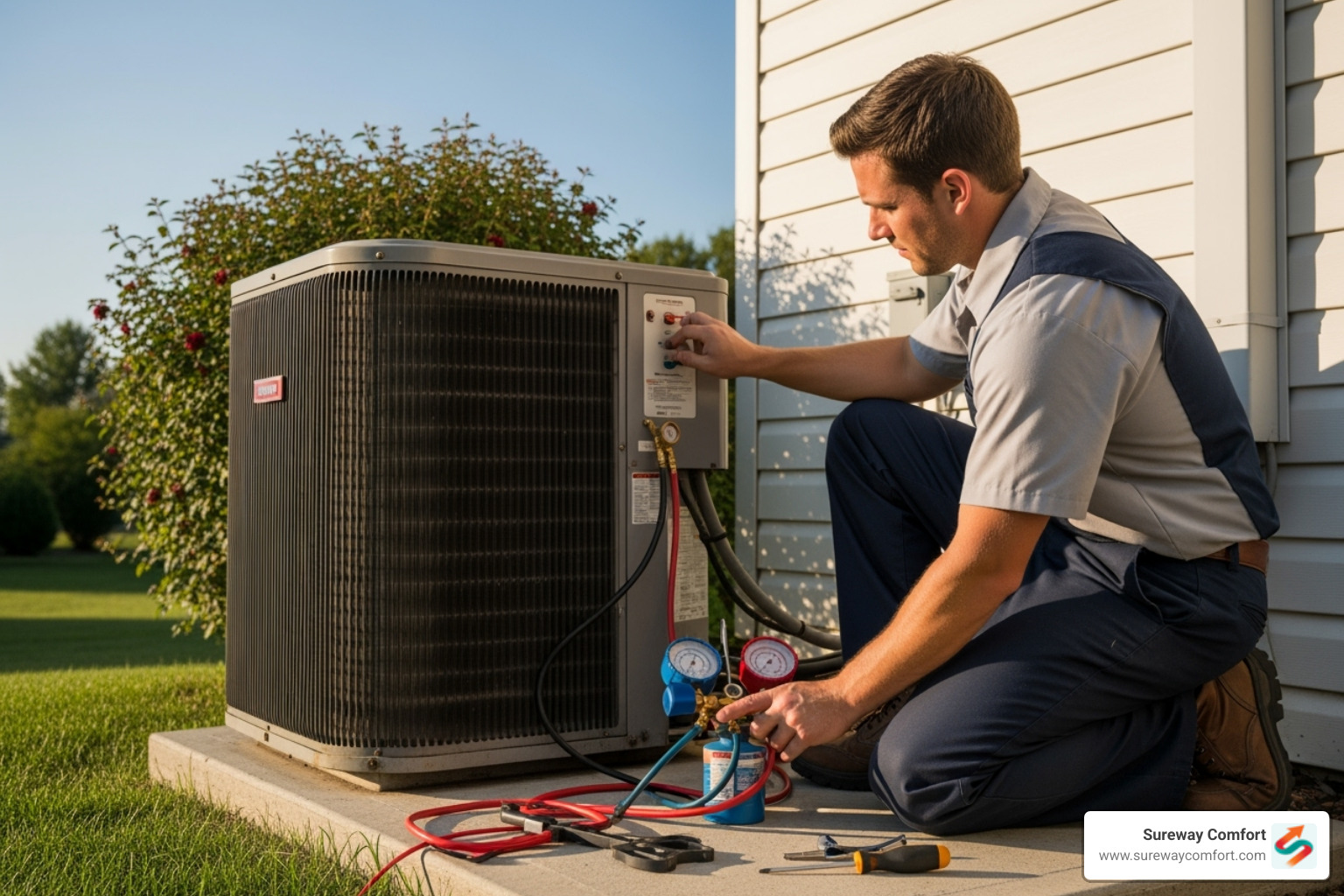
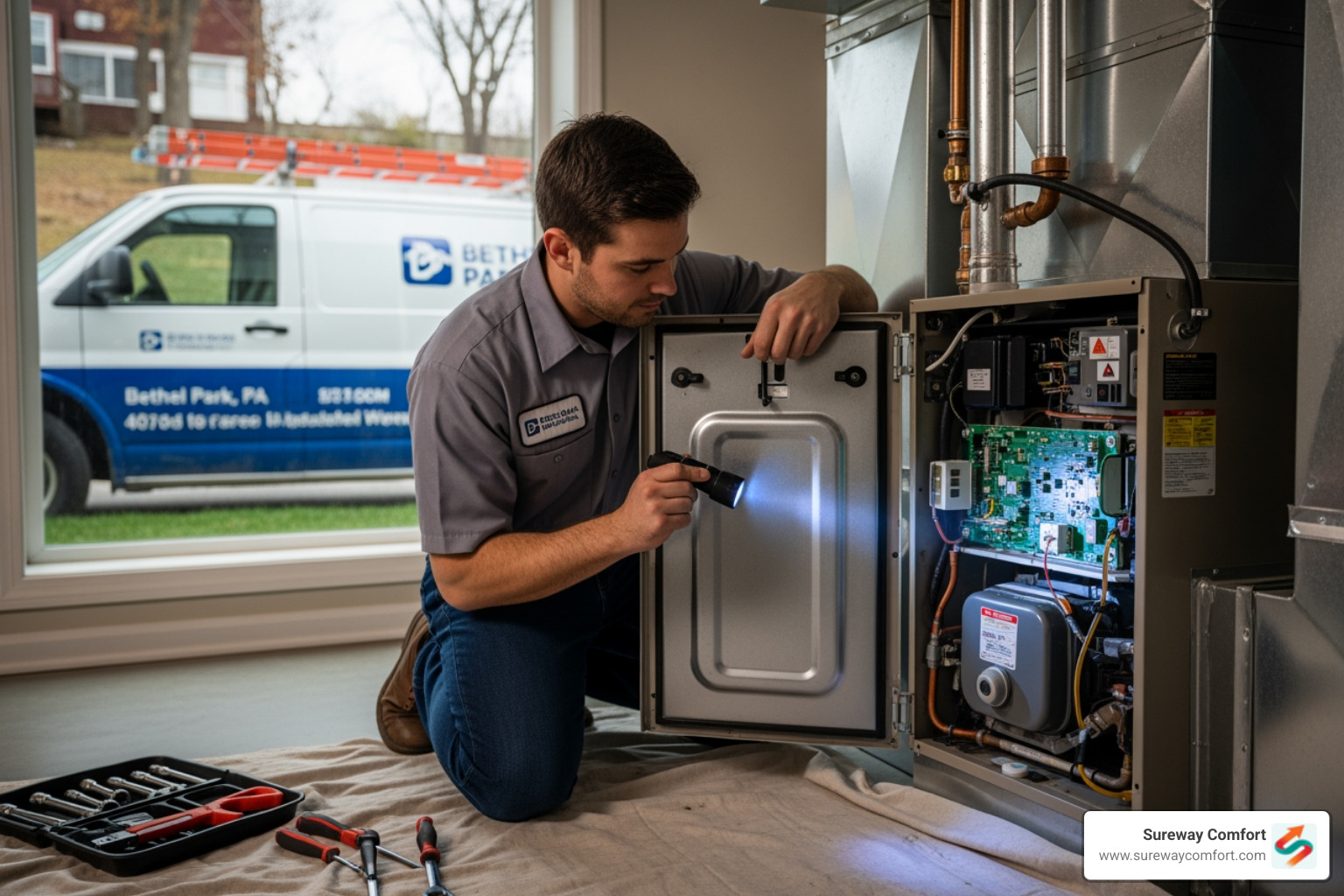

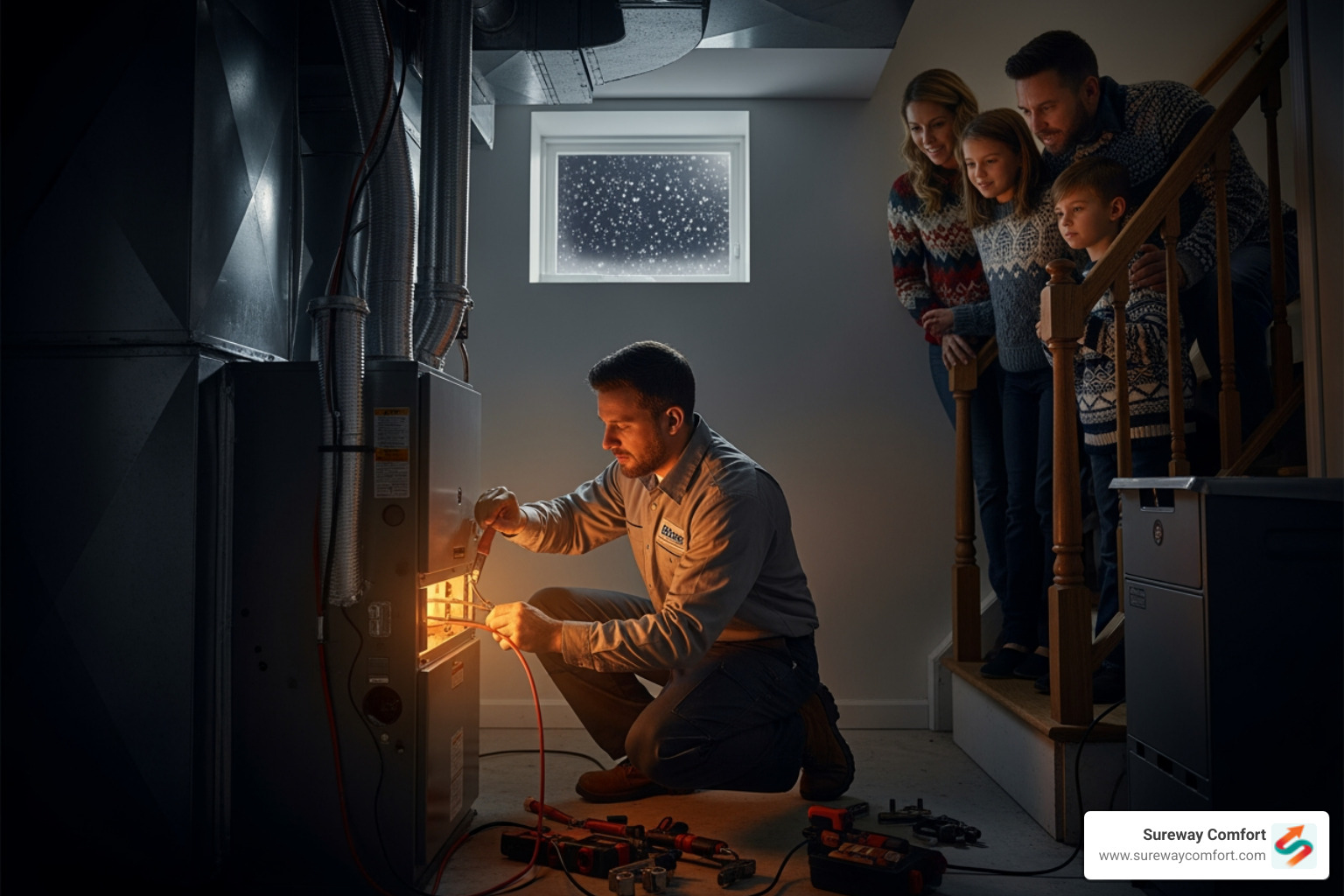
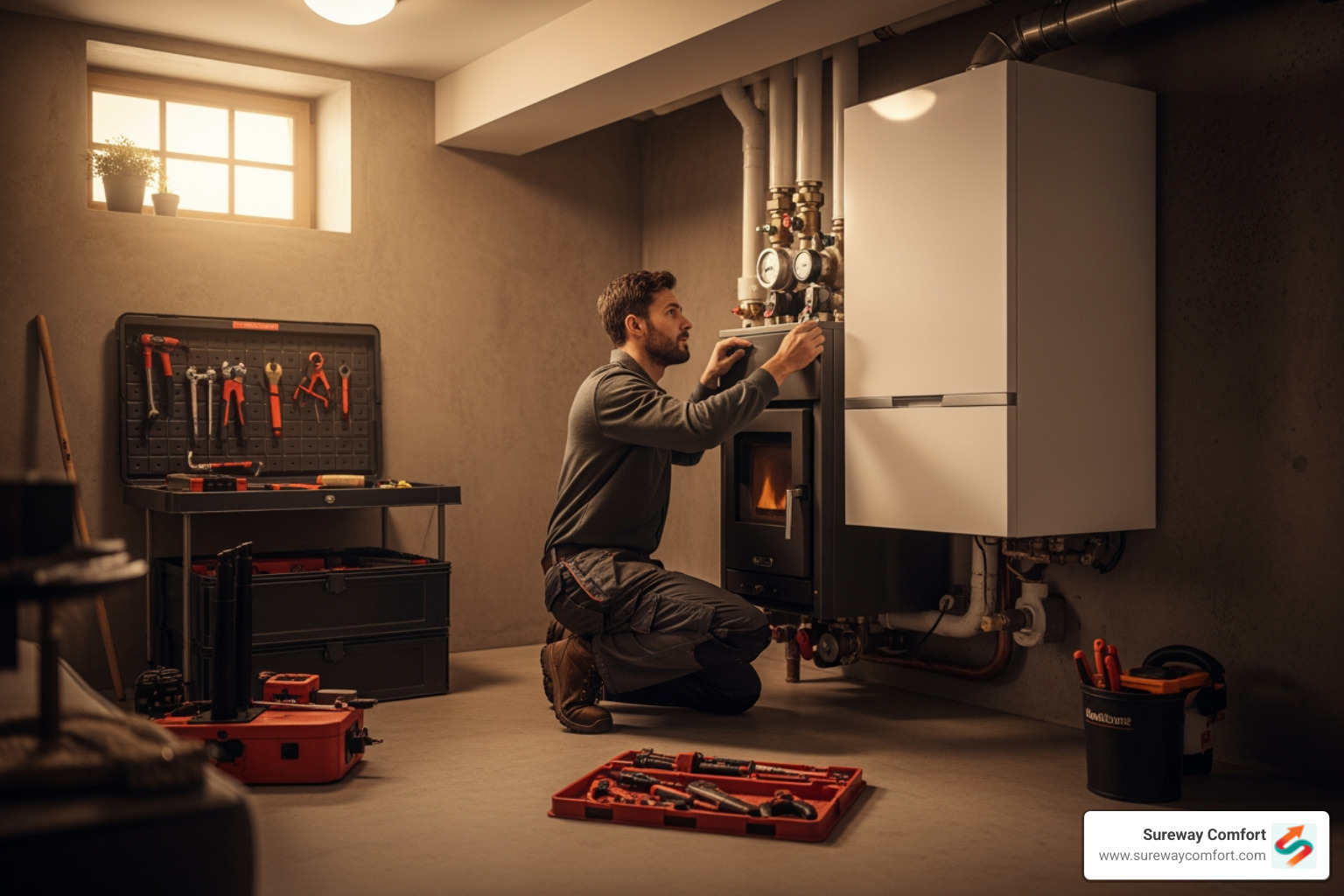




















.avif)



